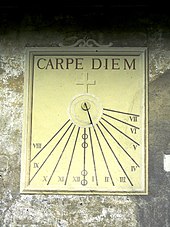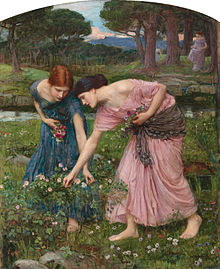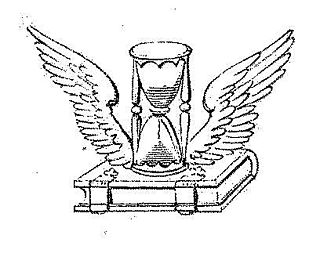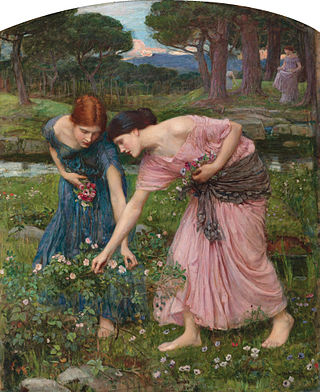
Carpe diem is a Latin aphorism, usually translated "seize the day", taken from book 1 of the Roman poet Horace's work Odes (23 BC). [1]

Carpe diem is a Latin aphorism, usually translated "seize the day", taken from book 1 of the Roman poet Horace's work Odes (23 BC). [1]
Carpe is the second-person singular present active imperative of carpō "pick or pluck" used by Horace to mean "enjoy, seize, use, make use of". [2] Diem is the accusative of dies "day". A more literal translation of carpe diem would thus be "pluck the day [as it is ripe]"—that is, enjoy the moment. It has been argued by various authors that this interpretation is closer to Horace's original meaning. [3] Latin scholar and Saint Joseph's University professor, Maria S. Marsilio points out, carpe diem is a horticultural metaphor that, particularly seen in the context of the poem, is more accurately translated as "plucking the day", evoking the plucking and gathering of ripening fruits or flowers, enjoying a moment that is rooted in the sensory experience of nature. [4]
Tu ne quaesieris, scire nefas, quem mihi, quem tibi | Ask not ('tis forbidden knowledge), what our destined term of years, |
Perhaps the first written expression of the concept is the advice given by Siduri to Gilgamesh in Mesopotamian mythology, telling him to forgo his mourning and embrace life, although some scholars see it as simply urging Gilgamesh to abandon his mourning, "reversing the liminal rituals of mourning and returning to the normal and normative behaviors of Mesopotamian society." [6] [7]
In Horace, the phrase is part of the longer carpe diem, quam minimum credula postero, which is often translated as "Seize the day, put very little trust in tomorrow (the future)". The ode says that the future is unforeseen and that one should not leave to chance future happenings, but rather one should do all one can today to make one's own future better. This phrase is usually understood against Horace's Epicurean background. [8]

Collige, virgo, rosas ("gather, girl, the roses") appears at the end of the poem "De rosis nascentibus" [9] ("Of growing roses", also called Idyllium de rosis) attributed to Ausonius or Virgil. It encourages youth to enjoy life before it is too late; compare "Gather ye rosebuds while ye may" from Robert Herrick's 1648 poem "To the Virgins, to Make Much of Time".
"De Brevitate Vitae" ("On the Shortness of Life"), often referred to as "Gaudeamus igitur", (Let us rejoice) is a popular academic commercium song, on taking joy in student life, with the knowledge that one will someday die. It is medieval Latin, dating to 1287.
Related but distinct is the expression memento mori (remember that you are mortal) which carries some of the same connotation as carpe diem. For Horace, mindfulness of our own mortality is key in making us realize the importance of the moment. "Remember that you are mortal, so seize the day." Over time the phrase memento mori also came to be associated with penitence, as suggested in many vanitas paintings. Today many listeners will take the two phrases as representing almost opposite approaches, with carpe diem urging us to savour life and memento mori urging us to resist its allure. This is not the original sense of the memento mori phrase as used by Horace.
In modern English, the expression "YOLO", meaning "you only live once", expresses a similar sentiment. [10] [11]
In the 1989 American film Dead Poets Society , the English teacher John Keating, played by Robin Williams, famously says: "Carpe diem. Seize the day, boys. Make your lives extraordinary." Later, this line was voted as the 95th greatest movie quote by the American Film Institute. [12]
In the Animal Crossing series, messages referencing this phrase can be seen when catching fish. In Animal Crossing and Animal Crossing: Wild World, catching a Crucian carp will result in the message "I caught a crucian carp! Carpe diem!" [13] In Animal Crossing: New Leaf, catching a Carp will result in the message "I caught a carp! I really seized the diem!" [14]
The Terry Pratchett comic fantasy novel Carpe Jugulum parodies the phrase in its title--instead of seize the day, it translates to "seize the throat". [15]
In 2011 the Phineas and Ferb episode "Rollercoaster", the musical ended with a song titled "Carpe diem" in which Before Phineas tells Isabella what "Carpe Diem means".
In the 2017 Korean drama series Chicago Typewriter , the club "Carpe Diem" is owned by Shin Yool and is the scene of revolutionary activities of the Joseon Youth Liberation Alliance spearheaded by Seo Hwi-young. [16]
Social philosopher Roman Krznaric suggested in his book Carpe Diem Regained (2017) that carpe diem is the answer to consumer cultures schedules, timed work days, consumer culture and planning out our actions over the course of weeks and the weekends, instead of "just do it", with thought experiments for seizing the day rather than placing into calendars. [17] [18]
The song "Carpe Diem" by Joker Out was used to represent Slovenia in the Eurovision Song Contest 2023. [19]
The acronym DiEM, used by the Democracy in Europe Movement 2025, alludes to the Latin aphorism.
In the song the Whole Being Dead Thing from Beetlejuice the musical, Beetlejuice sings "We should have carpe’d way more diems / Now we’re never gonna see ‘em!".

Quintus Horatius Flaccus, commonly known in the English-speaking world as Horace, was the leading Roman lyric poet during the time of Augustus. The rhetorician Quintilian regarded his Odes as just about the only Latin lyrics worth reading: "He can be lofty sometimes, yet he is also full of charm and grace, versatile in his figures, and felicitously daring in his choice of words."

Memento mori is an artistic or symbolic trope acting as a reminder of the inevitability of death. The concept has its roots in the philosophers of classical antiquity and Christianity, and appeared in funerary art and architecture from the medieval period onwards.
La Pléiade was a group of 16th-century French Renaissance poets whose principal members were Pierre de Ronsard, Joachim du Bellay and Jean-Antoine de Baïf. The name was a reference to another literary group, the original Alexandrian Pleiad of seven Alexandrian poets and tragedians, corresponding to the seven stars of the Pleiades star cluster.
"Dulce et Decorum est" is a poem written by Wilfred Owen during World War I, and published posthumously in 1920. Its Latin title is from a verse written by the Roman poet Horace: Dulce et decorum est pro patria mori. In English, this means "it is sweet and fitting to die for one's country". The poem is one of Owen's most renowned works; it is known for its horrific imagery and its condemnation of war. It was drafted at Craiglockhart in the first half of October 1917 and later revised, probably at Scarborough, but possibly at Ripon, between January and March 1918. The earliest known manuscript is dated 8 October 1917 and is addressed to the poet's mother, Susan Owen, with the note "Here is a gas poem done yesterday ."
"To His Coy Mistress" is a metaphysical poem written by the English author and politician Andrew Marvell (1621–1678) either during or just before the English Interregnum (1649–60). It was published posthumously in 1681.

"De Brevitate Vitae", more commonly known as "Gaudeamus igitur" or just "Gaudeamus", is a popular academic commercium song in many European countries, mainly sung or performed at university graduation ceremonies. Despite its use as a formal graduation hymn, it is a jocular, light-hearted composition that pokes fun at university life. The song is thought to originate in a Latin manuscript from 1287. It is in the tradition of carpe diem with its exhortations to enjoy life. It was known as a beer-drinking song in many early universities and is the official song of many schools, colleges, universities, institutions, student societies and is the official anthem of the International University Sports Federation.

"Ars Poetica", or "The Art of Poetry", is a poem written by Horace c. 19 BC, in which he advises poets on the art of writing poetry and drama. The Ars Poetica has "exercised a great influence in later ages on European literature, notably on French drama", and has inspired poets and authors since it was written. Although it has been well-known since the Middle Ages, it has been used in literary criticism since the Renaissance.
The Odes are a collection in four books of Latin lyric poems by Horace. The Horatian ode format and style has been emulated since by other poets. Books 1 to 3 were published in 23 BC. A fourth book, consisting of 15 poems, was published in 13 BC.

Dulce et decorum est pro patria mori is a line from the Odes (III.2.13) by the Roman lyric poet Horace. The line translates: "It is sweet and proper to die for one's country." The Latin word patria (homeland), literally meaning the country of one's fathers or ancestors, is the source of the French word for a country, patrie, and of the English word "patriot".

Tempus fugit is a Latin phrase, usually translated into English as "time flies". The expression comes from line 284 of book 3 of Virgil's Georgics, where it appears as fugitirreparabiletempus: "it escapes, irretrievable time". The phrase is used in both its Latin and English forms as a proverb that "time's a-wasting".
"Seize the night" is a traditional translation of the Latin phrase carpe noctem.
Advanced Placement (AP) Spanish Literature and Culture is a high school course and examination offered by the College Board's Advanced Placement Program.

"To the Virgins, to Make Much of Time" is a 1648 poem by the English Cavalier poet Robert Herrick. The poem is in the genre of carpe diem, Latin for "seize the day".
"Seize the day" is a traditional translation of the Latin phrase carpe diem.
Carpe diem is a Latin phrase, usually translated "seize the day".

The Satires is a collection of satirical poems written in Latin dactylic hexameters by the Roman poet Horace. Published probably in 35 BC and at the latest, by 33 BC, the first book of Satires represents Horace's first published work. It established him as one of the great poetic talents of the Augustan Age. The second book was published in 30 BC as a sequel.
David Russell Ferry was an American poet, translator, and educator. He published eight collections of his poetry and a volume of literary criticism. He won the National Book Award for Poetry for his 2012 collection Bewilderment: New Poems and Translations.

Carpe Diem is the third studio album by Spanish singer Belinda, released on March 23, 2010, through Capitol Latin. It is primarily electropop music, a departure from the pop rock sound of her previous albums. It debuted on the Billboard Top Latin Albums at number 12, number three on the Latin Pop Albums and number 21 on the Top Heatseekers Albums. In Mexico, entered at number seven and number five in the category in Spanish.

Roman Krznaric is an Australian-born social philosopher, whose books focus on the power of ideas to create change. His international bestsellers, including The Good Ancestor and Empathy, have been published in more than 25 languages. He is a Senior Research Fellow at the Centre for Eudaimonia and Human Flourishing at Linacre College, University of Oxford and the founder of the world's first Empathy Museum. His latest book, History for Tomorrow: Inspiration from the Past for the Future of Humanity, explores what we can learn from the last 1000 years of global history to tackle urgent issues ranging from the climate crisis to the risks of artificial intelligence.